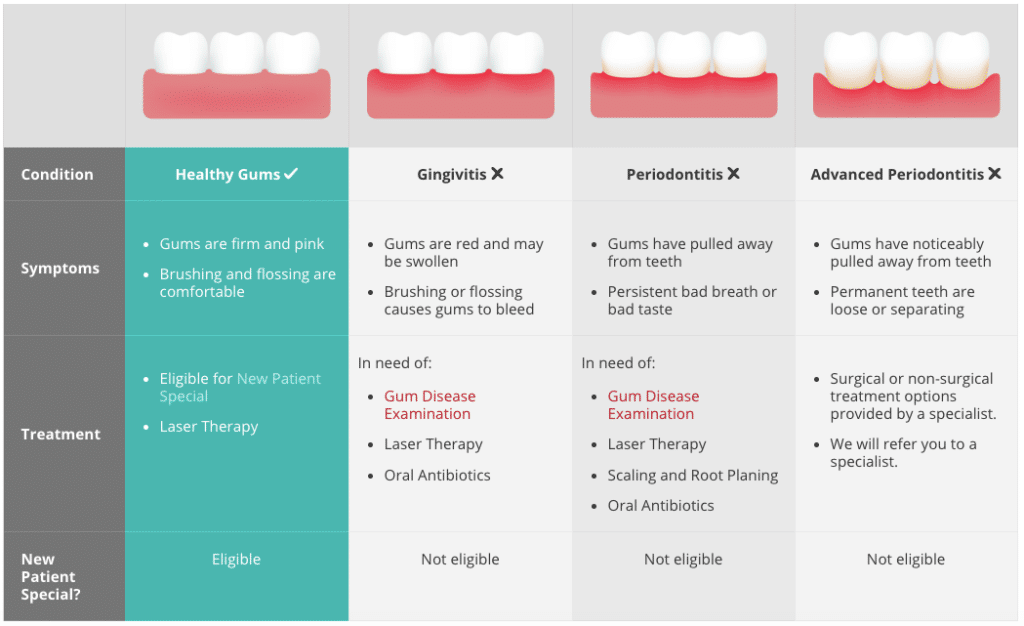Do you notice your gums bleeding when you brush or floss? This can be a sign of a problem if it occurs regularly. Let’s take a look at a few causes behind bleeding gums, what you can do about it, and what each of these issues might mean for your overall oral health.
Why Are My Gums Bleeding?
If your gums are bleeding when you brush or floss, you shouldn’t brush this symptom away. Your gums should not regularly bleed during daily oral care. Below are a few of the reasons why your gums might be bleeding. If your gums are bleeding and you’re in the Las Vegas areas, our dentists at BDG are ready to help. Make an appointment today to learn more and get solutions for healthier gums.
Gingivitis
Gingivitis is an early stage of gum disease, and the most common symptom is inflammation of the gums. This occurs when the accumulation of plaque, a film of bacteria on the teeth and gums, triggers an immune response in your body. This inflammatory response causes redness, swelling, and bleeding of the gums, especially during brushing or flossing. Gingivitis is reversible with proper oral hygiene and professional dental care.
Irregular Oral Hygiene
Inconsistent or inadequate brushing or flossing allows plaque to accumulate, leading to more bacterial growth. Plaque irritates the gums, causing inflammation and bleeding. Establishing a consistent oral care routine, including regular brushing, flossing, and professional cleanings with your dentist, is crucial to prevent and treat bleeding gums associated with poor oral hygiene.
Periodontal Disease
If gingivitis persists without intervention, it can progress to periodontitis. In periodontitis, the inflammation extends deeper, causing pockets between the teeth and gums. Plaque and bacteria can accumulate further in these pockets, leading to increased irritation, bleeding, and potential damage to the supporting structures of the teeth. Treatment can be more difficult at this stage, and may involve scaling and root planing to remove plaque and tartar from below the gumline.
Vitamin Deficiencies
Certain vitamin deficiencies can also weaken your tissues and cause excessive bleeding, which will cause gums to bleed more easily. Vitamin C deficiency, for example, can cause weakened blood vessels, bleeding gums, and overall oral health deterioration. Vitamin K deficiency may contribute to impaired blood clotting, leading to increased gum bleeding. Maintaining a balanced diet rich in vitamins can help you maintain your gum health.
Medications
Some medications can increase the likelihood of gum bleeding, like anticoagulants or blood thinners. It’s crucial to inform both your healthcare provider and dentist about the medications you are taking to ensure coordinated care and to address potential side effects.
Pregnancy Gingivitis
Pregnancy can cause many changes in the body, which can lead to significant health effects. Hormonal changes during pregnancy can exaggerate the body’s response to plaque, leading to pregnancy gingivitis. If you notice swollen and bleeding gums during pregnancy, this may be the case. Good oral hygiene and regular dental check-ups during pregnancy are essential to manage and prevent this condition.
Rough Toothbrushing
Brushing your teeth is essential to good hygiene, however it is possible to brush too hard, or use a toothbrush with bristles that are too rough. Brushing too hard or using a toothbrush with firm bristles can damage the gums and tooth enamel. Aggressive brushing may cause gum recession, exposing the tooth roots and making the gums more prone to bleeding. Using a soft-bristled toothbrush and gentle brushing techniques can help protect gum health.
Medical Conditions
Underlying medical conditions, such as diabetes, leukemia, hemophilia, and others, can lead to gum bleeding. Individuals with these conditions should coordinate care between their healthcare provider and dentist to address oral health concerns and prevent complications.
If you have bleeding gums, you can best protect your overall health by visiting your dentist. If bacteria are overwhelming your gums, or you have another underlying health condition, your dentist will be able to give you guidance about the best ways to protect yourself. Make an appointment with a BDG dentist today for a cleaning.



